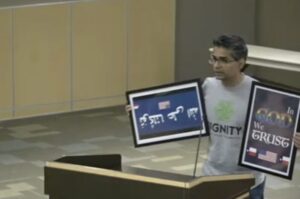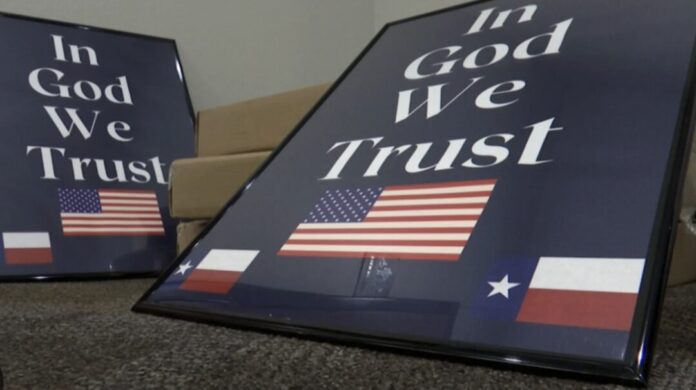“Congress shall make no law respecting an establishment of religion, or prohibiting the free exercise thereof; or abridging the freedom of speech, or of the press; or the right of the people peaceably to assemble, and to petition the Government for a redress of grievances.”
These are the words from the First Amendment of the Constitution of the United States, guaranteeing the freedom of speech, and religion. With this, the United States is constitutionally a secular country, one in which the Church and State are separated. Laws in the US cannot be made with religion in mind, and religion is to remain out of government institutions entirely. After all, freedom of religion means that one can practice their own religion freely, not that they can impose their religious beliefs onto others. In fact, many of the founding fathers spoke of the importance of separating the Church and the State, with Thomas Jefferson stating…
“I contemplate with sovereign reverence that act of the whole American people which declared that their legislature should ‘make no law respecting an establishment of religion, or prohibiting the free exercise thereof,’ thus building a wall of separation between Church & State.”
However, secularism has come under scrutiny in recent years, particularly from conservative Christians. Despite there always having been groups who emphasize religion over secularism, in the 21st century, the most prominent has been conservative Christians, with recent laws attempting to see a greater presence of Christianity in public schools. But why is this problematic? Don’t many public schools already teach about religion? And what about religious private schools?
The Problem With Religion in Public Schools
Regarding religious private schools, as these are private institutions, it is their right on whether or not they wish to promote religion; after all, the first amendment protects the rights of private institutions to practice and preach religion so long as it is not discriminatory, and those who can apply to private schools do so out of choice. It is therefore perfectly within the rights of religious schools such as Jesuit College Prep to teach Christian theology.
However, recently conservative Christians have been attempting to include Christianity more in public schools. Recent examples include Louisiana attempting to pass a law that will require the Ten Commandments to be displayed in classrooms, Oklahoma’s top education official ordering schools to incorporate the Christian Bible into teachings, Texas schools requiring ‘In God We Trust’ to be displayed in public schools, and states such as Florida allowing chaplains in public schools.

But what exactly is the problem with this?
Aside from this likely flying directly in the face of the First Amendment, these laws have been interpreted as attempts to impose religious beliefs onto children who may not be Christian, or not religious at all. In fact, on November 12th, district judge John DeGravelles stated that the law was a “coercive” state measure, and that the law could be interpreted as forcing Christianity onto children.
Even Christians have voiced opposition, one individual being Rev. Darcy Roake, who stated…
“We expect our children to receive their secular education in public school and their religious education at home and within our faith communities, not from government officials.”
Florida’s chaplain law was put on hold. Clearly, it was made specifically with Christian chaplains in mind, as when the Satanic Temple, a new non-theistic religious movement (In other words, they don’t actually believe in Satan) attempted to include chaplains, they were blocked by the State of Florida despite legally being recognized as a religion. In other words, this proves that the law was made specifically with Christianity and/or Abrahamic religions in mind, and not non-Abrahamic faiths, therefore making the law discriminatory.
Oklahoma’s law regarding the Bible being taught in public schools is by far the most radical and problematic of these anti-secularist laws. This was ordered by Superintendent of Public Instruction Ryan Walters. Simply put, this law is objectively forcing religion. What if the child isn’t Christian? Or not religious? Are they to be forced to study a completely different religion against their will? And if the Bible is being taught in schools and incorporated into lessons and framed in a manner of reverence, should other religious texts such as the Quran also be in public schools? On October 17th, 31 plaintiffs, encompassing public school parents, Baptist faith leaders, Catholic faith leaders, Presbyterian leaders, LGBTQ+ people, Atheists, and more, would file a lawsuit against Walters. In total, the law is expected to cost around $3M in taxpayer dollars, flying in the face of the Oklahoma state constitution which forbids using state funds to endorse a particular religion. One criticism of the law comes from Baptist pastor Rev. Mitch Randall…
“As a Christian, I’m appalled by the use of the Bible – a sacred text – for Superintendent Walters’ political grandstanding. As a member of the Muscogee (Creek) Nation, I’m alarmed by the parallels between this Bible mandate and the religious proselytization and forced assimilation my relatives faced in government boarding schools. As a taxpayer, I object to the state spending public funds on religious texts. The separation of church and state is a bedrock principle protecting religious liberty for every citizen; I urge the court to uphold this principle and strike down this mandate.”

Now, teaching about religion does not necessarily mean indoctrination. After all, in many public school curriculums, the religions of the world and their diverse practices are studied without holding any above the other. However, in this case, Christianity is being held above other religions, and other religions such as Judaism, Islam, Hinduism, and others, are entirely excluded. Education is along the lines of learning facts supported by science, and ensuring that the educated can develop critical thinking skills to raise questions and examine what has been learnt from multiple perspectives. Indoctrination however, ensures that the educated do not question at all what they are being taught, even if what is being taught has no actual basis. This therefore makes the laws akin to religious indoctrination.







